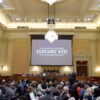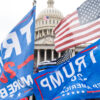Pyongyang ’s eagerness to conduct a nuclear test so quickly after its long-range missile launch shows it has abandoned its previous façade of negotiations and is instead striving to achieve a viable nuclear weapon and ICBM delivery capability. North Korea ’s unflinching efforts to develop the means to threaten the US and its allies with nuclear weapons underscores the ongoing need to continue to develop and deploy a missile defense system.
The rapid pace of Pyongyang ’s provocations since January indicates it has altered its objectives and is no longer responsive to diplomatic entreaties. International diplomatic pressure was unable to prevent North Korea from launching a Taepo Dong-2 missile in April. The paltry sanctions subsequently imposed by the UN Security Council for North Korea’s violating UN Resolutions 1695 and 1718 were insufficient to deter Pyongyang from its nuclear test.
Previous North Korean tactics were to engage in a slow buildup prior to an escalatory act in order to allow the US and its allies sufficient time to offer new diplomatic or economic inducements to buy Pyongyang back from the brink. On those occasions when North Korea carried out the act, it followed with several months of calm to allow all countries to become accustomed to the new elevated status quo prior to initiating the next lengthy provocation process.
Since the beginning of 2009, however, North Korea has engaged in a series of provocations against the US , South Korea , and Japan without allowing any time for diplomatic outreach. It is evident that Pyongyang is now intent on achieving strategic technological achievements rather than gaining tactical negotiating leverage. As such, North Korea is likely to continue additional missile and nuclear activity during 2009 impervious to naïve initiatives such as offering a senior-level presidential envoy for bilateral discussion.
Despite high expectations that North Korea would adopt a moderate policy after the change in US leadership, Pyongyang has refused repeated attempts by the Obama administration to establish contact. North Korea ’s refusal to engage in dialogue with the US , South Korea , and Japan is another indicator Pyongyang is playing a new game.
The change in North Korean objectives may have been triggered by Kim Jong-il’s health crisis and a desire to achieve nuclear objectives prior to his death or a formal succession. Pyongyang has announced it seeks to become a “powerful nation” by 2012, the 100th anniversary of Kim Il-sung’s birth. The goal may reflect achieving formal recognition as a nuclear weapons state.
Discussions with US and South Korean officials indicated Washington and Seoul were complacent with the minimalist UN Security Council response to North Korea ’s provocations. The Obama and Lee Myung-bak administrations were reticent to pursue any initiatives beyond the three North Korean companies placed on the UN sanctions list. Instead, the US and South Korea were passively awaiting the next North Korean provocation to then use it to leverage China for additional punitive measures in the UN.
The US, South Korea, and Japan should utilize North Korea’s latest outrage to demand China and Russia agree to stronger punitive measures in the UN Security Council. Washington should cease the charade of praising Beijing ’s behavior in the Six Party Talks and instead criticize its obstructionism to carrying out the will of the international community as expressed in two UN resolutions.
Washington should press for additional North Korean as well as foreign companies and government agencies to be added to the UN sanctions list and insist on active enforcement. In addition, the Obama administration should lead a multilateral effort to identify and target proliferators as well as those complicit in North Korea ’s illegal activities such as currency counterfeiting and drug smuggling.


























